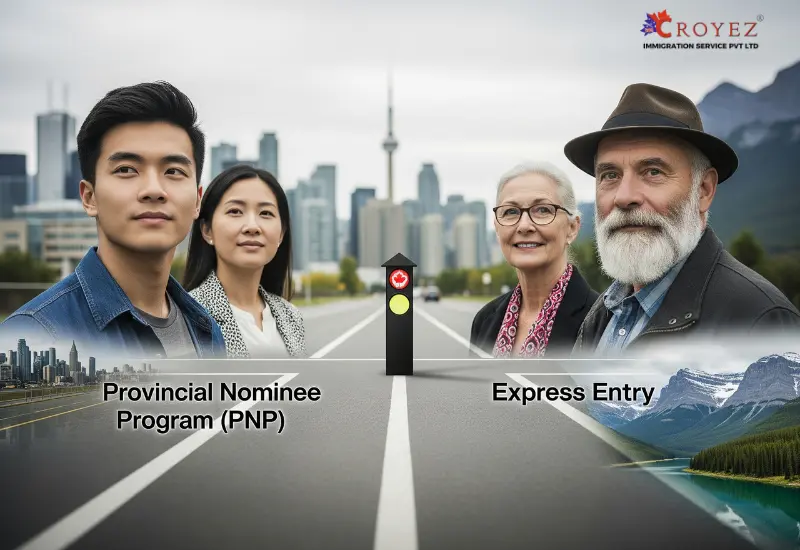Canada's Permanent Residency (PR) process is robust and flexible, which helps attract skilled immigrants from around the world. The Provincial Nominee Program (PNP) and Express Entry are two of the most common ways to find work. Both options will lead to Canadian PR, but it's essential to select the right stream so that your profile aligns with Canada's immigration objectives. Croyez Immigration has been assisting individuals with Canadian immigration issues for many years. They help people who apply in 2025 make the best choice for them so that they have the best chance of success.
What is Express Entry, and how to apply for Express Entry Canada?
Overview
Canada's primary online system for processing skilled immigration applications is known as the Express Entry system. The Federal Skilled Worker Program (FSW), the Federal Skilled Trades Program (FST), and the Canadian Experience Class (CEC) are three economic programs that help expedite the processing of PR applications. People who want to apply create an online profile, join the Express Entry pool, and then wait for Invitations to Apply (ITA) based on their ranking. Immigration, Refugees and Citizenship Canada (IRCC) conducts regular draws, during which individuals with the highest Comprehensive Ranking System (CRS) scores receive invitations.
CRS Score System & What is the minimum CRS score for Express Entry in 2025?
The CRS is a points system that gives candidates points based on their age, education, work experience, language skills (as shown by IELTS or a similar test), and ability to adapt. If you hold a degree from Canada, have a job offer, or have been nominated by a province, you receive extra points. The CRS cut-offs for general draws in 2024–2025 are likely to be between 470 and 510. This will make the competition much tougher. For specialised draws, like those for tradespeople or French speakers, the requirements may be lower.
Pros and Cons to know who is eligible for Express Entry to Canada?
Express Entry is known for being fast; most applications are reviewed within six months of receiving an ITA. It is a straightforward system that awards prizes to individuals who perform well, but it can be challenging for those whose CRS score is lower than the average for the draw. If you don't have a provincial nomination or a job offer, it's challenging to obtain an ITA because many people are competing for them.
What is the Provincial Nominee Program (PNP)?
Overview of PNP
The PNP allows provinces and territories in Canada to select individuals who wish to relocate to a specific area and contribute to their economy. Each province ensures that its streams meet the job market needs in that area. PNP is a way for individuals who may not meet the high CRS cut-offs for Express Entry to secure a job in a province where their skills are in demand. Saskatchewan, for instance, needs people who work with computers, and Manitoba needs people who work in agriculture.
Types of PNP
There are two main types of PNP: Base and Enhanced. Enhanced PNP streams can be used with the Express Entry system. If someone is nominated through one of these, they get 600 extra CRS points, which almost guarantees an ITA. Base PNP streams don't work with Express Entry, so candidates have to apply for PR right after the province approves them. Applicants can choose between the two options based on their profile and the specific needs of the provincial stream.
Pros and Cons
The best thing about PNP is that it allows people with a CRS score that wouldn't otherwise qualify for an Express Entry ITA to obtain PR. Provincial nominations can also benefit individuals with strong ties to a province or those who have received a job offer in that province. However, it can take longer to process a PNP application than just Express Entry, especially for base nominations. Additionally, applicants must reside and work in the province that nominated them, which makes these programs less flexible than federal programs.
Ultimately, both Express Entry and PNP offer great opportunities; however, which one is better for you depends on your specific circumstances, goals, and skills. People who are applying should consider seeking help from a professional to make the best choice.
Key Differences Between PNP and Express Entry
When you compare the Provincial Nominee Program (PNP) and Express Entry Canada Immigration, there are a few things that stand out that could make a big difference in an applicant's choice. Your chances of being selected in Express Entry depend significantly on your CRS score. This means that your chances primarily rely on how well you can achieve a competitive score, which is usually above 470 or even higher in 2025 drawings. The PNP, on the other hand, has less strict CRS requirements. This means that individuals with lower ratings can still obtain permanent residency if they can demonstrate that they have ties to the province or meet specific regional needs. People who apply for Express Entry don't have to have ties to any province so they can live anywhere in the country. However, the PNP often requires a promise to live and work in the province that is being removed. The processing times also vary: Depending on the stream and province, the PNP can take more than a year. Express Entry usually takes six to eight months. You don't need a job offer to apply for Express Entry, but some PNP streams might require one. People from all over the country have more options with Express Entry, but the PNP only matches applicants with needs and opportunities in their province.
Which is Better for You?
When to Choose Express Entry
Express Entry Visa Canada is the best choice if your CRS score is competitive and expected to be over 480 in 2025. After you get your PR, you can choose where to live with Express Entry. This is great if you're unsure which province you'd like to live in. Additionally, it's beneficial for individuals who prefer prompt processing, as IRCC aims to complete most Express Entry applications within six months of receiving an Invitation to Apply (ITA).
When to Choose PNP
If your CRS score is around 400 or lower, PNP is the best choice because you might not be able to enter Express Entry drawings. If you already have family, friends, or a job in a particular province, the PNP could be beneficial. If your job is in demand in smaller or less populated provinces, PNP streams usually let you apply for a nomination even if you don't have a high CRS score.
Can You Combine Both?
Combining the Canadian Express Entry Visa and PNP can give you an edge in strategy. Express Entry links to improved PNP streams, which let provinces pick candidates from the federal pool. Candidates who receive a provincial nomination in this manner gain 600 additional CRS points, which places them at the top of the Express Entry pool and increases their chances of receiving an ITA in the next draw. Croyez Immigration helps people choose between these two paths all the time. They help people find provinces with the right streams and maintain a competitive Express Entry profile. This plan gives you the most freedom and the best chance of getting permanent residency in Canada.
Final Verdict – PNP vs. Express Entry
You need to consider several factors before choosing between the Canada Express Entry Visa and the PNPs. These include your CRS score, the express entry Canada processing time, the status of your job offer, your ties to provinces, and the amount of money you have available for the application process. If you have a high CRS score and don't care about the province you live in, you should go for Express Entry. People with lower scores, those who know someone in a specific area, or those who want to work in high-demand jobs in smaller provinces should seriously consider the PNP, though. By using custom mixes of PNP and Express Entry, we've been able to help people get their PR approvals quickly and without any stress at Croyez Immigration. Even people who initially thought their profiles weren't competitive have achieved success with this approach. If you use them wisely, both paths can help you get to Canada's future.
How Croyez Immigration Helps
We at Croyez Immigration are proud to offer personalised PR pathway consultations tailored to each applicant's unique background, goals, and skills. Whether you want to apply for Express Entry or a Provincial Nominee Program Canada (PNP), our staff will look at every part of your background to find the best way for you to get Canadian permanent residency. We can help you earn more points by providing personalised advice on how to improve your language test scores, job offers, or educational qualifications. This will help you raise your Comprehensive Ranking System (CRS) score. Croyez Immigration handles the entire application process, ensuring that all forms are completed accurately, thoroughly, and on time. We consult with immigration officials to ensure that the process is not overly prolonged. Our clients also benefit from having access to the most recent information about 2025 PR trends, draw patterns, and shifting provincial goals in an ever-changing immigration landscape. This helps them stay ahead in the process of moving to another country.
Frequently Asked Questions (FAQ)
Can I switch from Express Entry to PNP?
You can change your plan from Express Entry to PNP, yes. Many people begin with Express Visa Canada and then explore PNP options when they discover that their CRS score may not be high enough to win the federal lottery. You can get a provincial nomination through better PNP streams linked to Express Entry. This gives you 600 points on your CRS score and almost guarantees an Invitation to Apply (ITA) at the next draw.
What is a good CRS score in 2025?
By 2025, most federal drawings are expected to have a competitive CRS score of 480 or higher. However, this could change depending on program-specific invitations and targeted job draws in high demand. It's essential to stay up-to-date with trends, as the way people draw may evolve in response to Canada's immigration goals and the changing needs of the job market.
Is PNP guaranteed PR?
Getting a provincial nomination is a big deal, but it doesn't mean you'll get permanent residency right away. You still have to meet the requirements set by the federal government and pass medical, security, and admissibility checks. But a nomination makes your case much stronger, especially when it goes through Express Entry-linked streams, where the extra CRS points almost always lead to an ITA.
Do I need a job offer for PNP?
Not all the time. Some PNP streams require a job offer from an employer in the province where the application is being made, but many do not. There are often streams in provinces for individuals who have worked there before, international graduates, or those with jobs on the in-demand lists. You don't always need a job offer to get started. You may be eligible depending on the specific PNP stream and its requirements.
Conclusion
When it comes to choosing between Express Entry and PNP, there is no one right choice. Each track has its pros and cons based on your profile, CRS score, timing, and career goals. Individuals with high scores should consider using Express Entry because it processes applications efficiently and is accessible nationwide. PNP, on the other hand, allows people with connections to a province or skills in demand there to enter in more flexible ways. The most important thing is to carefully consider your situation and plan your immigration trip with the help of experts who understand how Canada's immigration system works. Croyez Immigration is a trustworthy partner that will help you make your dream of moving to Canada a reality.





